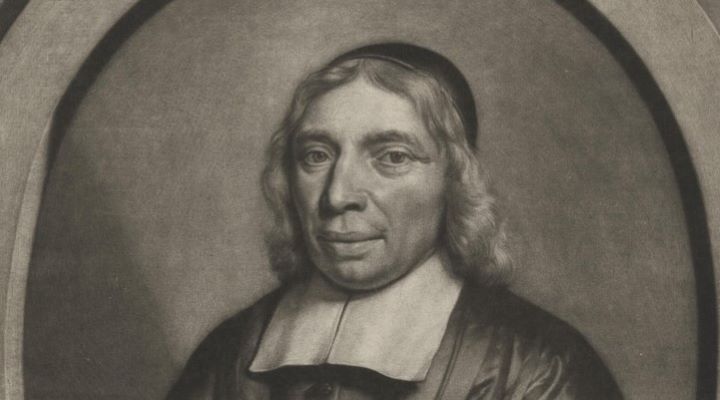In this series, we have been looking at what God’s Word says about adoption as both an earthly call to care for orphans and as a picture of how He saves undeserving sinners in need of right relationship with Him. You can read Parts I, II, III, IV, V, VI, and VII here. In the previous article, we started a new phase of this series by learning what some of our most well-known theologians have said about this doctrine, beginning with “The Theologian”, John Calvin. In today’s article, we get to hear from one of the more obscure, but no less important theologians, Wilhelmus A Brakel.
Who was Wilhelmus à Brakel?
Wilhelmus à Brakel was born in 1635 to Theodorus and Margaretha à Brakel. He is believed to have been converted at a young age, possibly through the preaching of his father, who pastored Reformed churches of the Neatherlands.[1] Wilhelmus was a student of Gisbertus Voetius and Andreas Essenius. Like many others, the Lord saw fit to place earthly fathers and father figures into his life which helped shape him. He would go on to join the Second Dutch Reformation, promoting piety and a Calvinist subculture working within official church associations.[2] His ministry spanned almost fifty years, serving five congregations in the national church of the Netherlands.
The Christian’s Reasonable Service
Wilhelmus à Brakel’s four-volume The Christian’s Reasonable Service has been called “an enduring masterpiece of piety” and one of the high points of the Dutch Further Reformation.[3] In it, he gave the church a systematic theology as well as a guide for Christian ethics and living, and the doctrine of adoption features prominently. Following a lengthy passage on the believer’s justification before God by grace through faith, à Brakel dedicates an entire chapter just to adoption.[4]
As a theologian in the Puritan tradition, Wilhelmus à Brakel was part of a movement that developed the doctrine of adoption as an experiential reality, not merely an academic theory.[5] Interestingly, he saw adoption or “spiritual sonship” as included within justification.[6] Adoption is inseparable from union with Christ, or as he put it, “They are children by reason of being united to the Son of God as members of one body (Ephesians 1:23).[7] Since the Head is Son of God, this is likewise true for the members, who, together with the Head, constitute one body.”[8]
Wilhelmus a’ Brakel’s preaching was consistently Christ-centered and experiential, consistent with the English Puritans. He often spoke of believers as those who practiced “refuge-taking” faith in Christ. Believers have been “children of God” in the Old and New Testaments, a fact not negated by John’s statement that “now we are sons of God.” (cf. 1 John 3:2). The already of adoption is a present already and a future not yet (cf. Romans 8:23).
a’ Brakel also provided readers with what he called “Marks of Sonship”. These evidences of adoption include the exercising of saving faith, bearing God’s image by possessing “delight and desire only to do his will”, and radiating a “divine love, reciprocal love” which originates with God (cf. 1 John 4:19). Each of the three marks is followed by several helpful questions that a’ Brakel provides for self-examination with the goal of gaining assurance of adoption.
End of Life
Joel Beeke and Randal Pederson describe how Wilhelmus a’ Brakel’s congregants grew to cherish his fatherly demeanor in ministry and affectionately called him “Father Brakel.”[9] In 1711, at seventy-six years old, Wilhelmus fell ill for several months and knew he would not recover. He was asked how he saw his condition and said, “Very well: I may rest in my Jesus. I am united to Him and am awaiting his coming for me; meanwhile, I submit myself quietly to him.”[10]
Conclusion
If you have never turned from your sin and looked to Jesus Christ as your Savior, do it now. Whether you had an earthy father who was there for you or not, you will never find true peace and assurance until you are right with your Heavenly Father. His Son took the punishment that we all deserve, and He accomplished what none of us could accomplish. God not only takes sinners and declares them just because of what Jesus did, but He also adopts those same sinners and welcomes them into his family.
I want to leave you here with some of those probing questions Wilhelmus a’ Brakel asked his readers to consider in order to determine if they were truly adopted children of God.
“Therefore, do you perceive that upon a sensible view of your sinful and condemnable condition, you have taken refuge to, and with many prayers and supplications continue to take refuge to Jesus Christ? Have you taken refuge to Him out of a heartfelt desire to be reconciled to God and to be in this state of sonship: to live in communion with God, in peace of conscience, in love to God, and in fear before Him; to attain to the disposition and exercise of sanctification; to battle continually against sin; to be preserved in your faith; and to enjoy eternal felicity? Have you taken refuge to Jesus Christ, knowing Him to be a complete Surety who is fully qualified to save, as One who in His goodness calls and invites you by means of the gospel, as One who offers Himself so that He may communicate this fullness to you, and as One who is true and mighty? I repeat, have you taken refuge to Him ….?”[11]
In future articles, we will look at what other great theologians have to say about adoption.
If you have questions, comments, or requests for other topics, please feel free to contact me or leave us a comment below.
[1] Joel R. Beeke & Randal J. Pederson, Meet the Puritans: With a Guide to Modern Reprints (Grand Rapids: Reformation Heritage Books, 2006), 745.
[2] Fred A. van Lieburg, “From Pure Church to Pious Culture: Further Reformation of the Seventeenth-Century Dutch Republic” in Later Calvinism: International Perspectives. ed., W. Fred Graham, (Kirksville: Sixteenth Century Journal Publishers, 1994), 428-429.
[3] Nick Needham, 2000 Years of Christ’s Power – Volume 4: The Age of Religious Conflict (Ross-Shire: Christian Focus, 2016), 114-115. Curt Daniel, The History and Theology of Calvinism (Darlington: Evangelical Press, 2019), 70.
[4] Wilhelmus a’ Brakel, The Christian’s Reasonable Service – Volume 2: The Church and Salvation (Grand Rapids: Reformation Heritage Books, 1993), 415-438.
[5] Michael M. Dewalt, “The Doctrine of Adoption: Theological Trajectories in Puritan Literature” Puritan Reformed Journal 7 – 2 (2015): 129-130.
[6] Wilhelmus a’ Brakel, The Christian’s Reasonable Service – Volume 2: The Church and Salvation (Grand Rapids: Reformation Heritage Books, 1993), 415.
[7] Wilhelmus a’ Brakel, The Christian’s Reasonable Service – Volume 2: The Church and Salvation (Grand Rapids: Reformation Heritage Books, 1993), 428-430.
[8] Wilhelmus a’ Brakel, The Christian’s Reasonable Service – Volume 2: The Church and Salvation (Grand Rapids: Reformation Heritage Books, 1993), 420.
[9] Joel R. Beeke & Randal J. Pederson, Meet the Puritans: With a Guide to Modern Reprints (Grand Rapids: Reformation Heritage Books, 2006), 750.
[10] Joel R. Beeke & Randal J. Pederson, Meet the Puritans: With a Guide to Modern Reprints (Grand Rapids: Reformation Heritage Books, 2006), 750.
[11] Wilhelmus a’ Brakel, The Christian’s Reasonable Service – Volume 2: The Church and Salvation (Grand Rapids: Reformation Heritage Books, 1993), 428.





Robert, thank you very much for the kind words, brother. That sincerely means a lot to me that your spirit…